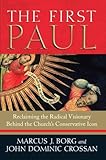 The First Paul: Reclaiming the Radical Visionary Behind the Church's Conservative Icon by Marcus J. Borg
The First Paul: Reclaiming the Radical Visionary Behind the Church's Conservative Icon by Marcus J. BorgI always enjoy reading Borg and Crossan. This book is every bit the joy to read that their previous works have been. Scholarly but highly readable, clear, concise, and very informative.
The essential point of the book is that Paul has been misread by nearly everyone. Paul is typically read as ordering wives to submit to their husbands, condemning gays, and as offering up the Christian faith as a set of doctrines which are dogmatically asserted to be "beyond dispute." Religious conservatives read Paul this way and rejoice, religious liberals read Paul this way and recoil.
The Problem is, as Borg and Crossan see it, that this is just not Paul. To begin with, although there are 14 letters in the New Testament attributed to Paul, there is a a massive scholarly consensus that Paul surely did not write at least 4 of these, and probably only wrote 7 of the letters attributed to him. If this claim is accepted, and there is good reason to accept it, then the passages in Paul commanding slaves to obey their masters and wives their husbands vanish from the authentic Paul's writings (although even in the 7 "authentic letters" Paul still condemns homosexuality).
Borg and Crossan claim that those later "Pseudo-Pauline" letters contain passages deliberately created to subvert the real Paul's message, which was radically egalitarian - seeing all people regardless of gender, social status, etc as fundamentally equal in Christ and before God. There are numerous passages that support this reading of Paul. From his comments about inclusion regarding celebration of the Eucharist, to his constant references to and praise of female "co-workers and Apostles."
Most famously however is Paul's ecstatic assertion in Galatians (also repeated in Romans) that "There is neither Jew nor Greek, there is neither slave nor free, there is neither male nor female; for you are all one in Christ Jesus" (3:28). Add to this exclamation Paul’s request to Philemon (in the letter of that name) that he free his runaway slave Onesimus and accept him as an equal "brother," and you have Borg and Crossan's case for a "radically egalitarian" Paul. It is compelling.
Despite my admiration for their book, I have some criticism of Borg and Crossan. They downplay those passages - present frequently even in in the letters they accept as authentic - in which Paul stresses God's judgment, wrath, and exclusion of "the unrighteous." Presumably they are uncomfortable with this; so am I. But those passages display a genuine aspect of Paul's thought and they must be dealt with.
Likewise, though they correctly argue that Paul opposed the Lordship of Jesus to that of Caesar and thereby explicitly rejected Roman social norms and Imperialism, Borg and Crossan fail to adequately deal with the obvious fact that Paul had no real program for social reform. Since Paul thought Christ would very soon return to earth to establish the Utopian Kingdom of God what need was there for practical reform? Borg and Crossan recognize that Paul believed in Jesus' imminent return, but seem to brush it off as peripheral. That is problematic. Of course Paul's thought can still be made to yield a real platform for social reform, but that is a task for those of us reading Paul; Paul himself did not engage in it.
When all is said and done, however, Borg and Crossan have accomplished their task. Anyone who reads their book cannot help but come away from it with a great appreciation of Paul. Paul was not the conservative enforcer of religious dogma and hierarchy, but a radical egalitarian, whose vision was one of everlasting peace, with all people equal before, and one with, the God in whom “we live, and move, and have our being” (Acts 17: 28a).
View all my reviews.
Hey Doc,
ReplyDeleteThanks for the education. I learned something.
I surfed, found your blog and will add it to my list.
I am a 34 year veteran teacher of government/eoonomics
I would appreciate your comments on my blog:
Hi Del,
ReplyDeleteThanks for the kind words. I'm not a Doc yet, still working on my dissertation.
I checked out your blog and rather like it, I'll be sure to follow it!
Greetings,
Matt